Baidu Intelligent Cloud Grants Work Permits to 'Digital Employees'
![]() 08/06 2025
08/06 2025
![]() 688
688
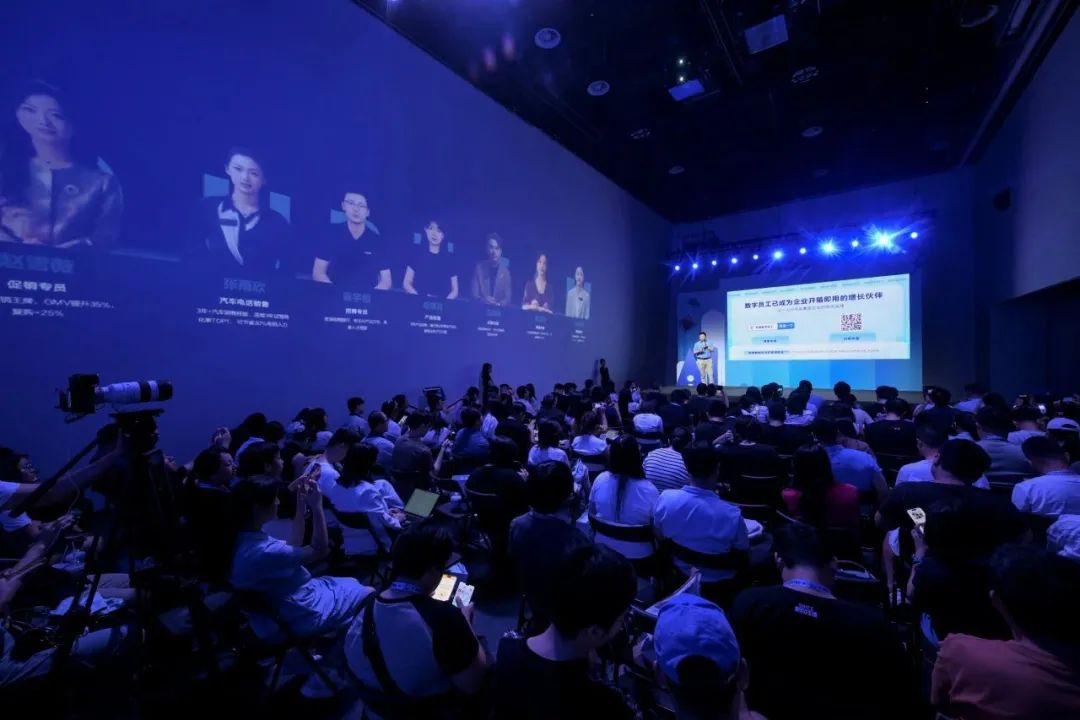
Digital Employees Prepared for Deployment
Author | Gu Nian
Editor | Yang Zhou
In enterprise organizations, a work permit symbolizes not just identity but a comprehensive set of employment standards. This time, Baidu aims to establish such standards for digital humans.
On August 5, Baidu Intelligent Cloud unveiled the world's first batch of 'Digital Employees.' Unlike previous 'virtual humans' that focused on imagery, these digital employees are not merely anthropomorphic representations but hold clear business responsibilities: generating leads, managing processes, and delivering results.
Baidu's vision is clear: as AI integrates into the core functions of enterprises, it must transition from 'looking like an employee' to 'acting as an employee.'
Past digital humans were virtual representations of a 'person,' whereas digital employees are 'new colleagues' that adhere to corporate systems and possess independent output capabilities. To differentiate between the two, Baidu has established three employment standards for digital employees: business understanding, result delivery, and continuous evolution.
Behind these three capabilities lies Baidu's redefinition of digital human employment: only agents with business acumen, process integration, and autonomous evolution can be deemed employees eligible for work permits. A work permit is not a mere badge of technical achievement but a testament to production responsibility.
As large AI models accelerate their industry adoption, 'Digital Employees' may become the first widely-adopted product form of the digital human concept in B2B scenarios. Through this issuance of work permits, Baidu aims to pioneer a set of implementable industry standards.
01 Three Standards for 'New Colleagues'
Unlike previous 'virtual humans' that were more image-focused, these AI capabilities often emphasized physical resemblance, providing an anthropomorphic feel rather than clearly fulfilling business metrics or acting as intelligent agents that complete sales or service processes.
A digital human is a 'general virtual image' that can speak, while a digital employee is a 'new colleague' that meets enterprise employment standards. At the latest Baidu AI Day, Baidu Intelligent Cloud launched the first batch of AI digital employees, covering key roles such as marketing specialists, course consultants, and automotive telemarketers.
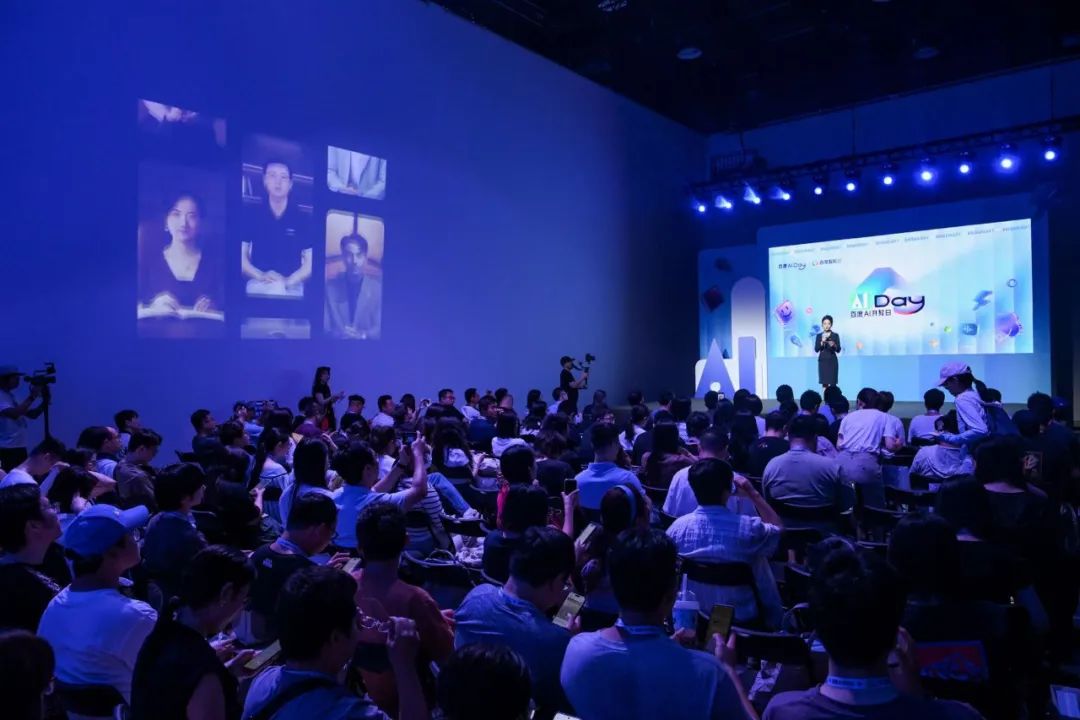
As an AI application leveraging Baidu Intelligent Cloud's full-stack AI capabilities and industry knowledge data, Baidu's digital employees can provide out-of-the-box product capabilities for various stages of the enterprise marketing journey. They no longer merely deliver AI tools to enterprises but tangible business benefits or results.
To be selected as a digital employee, one must first understand the business: not just answering questions but genuinely grasping the industry's knowledge system and execution processes.
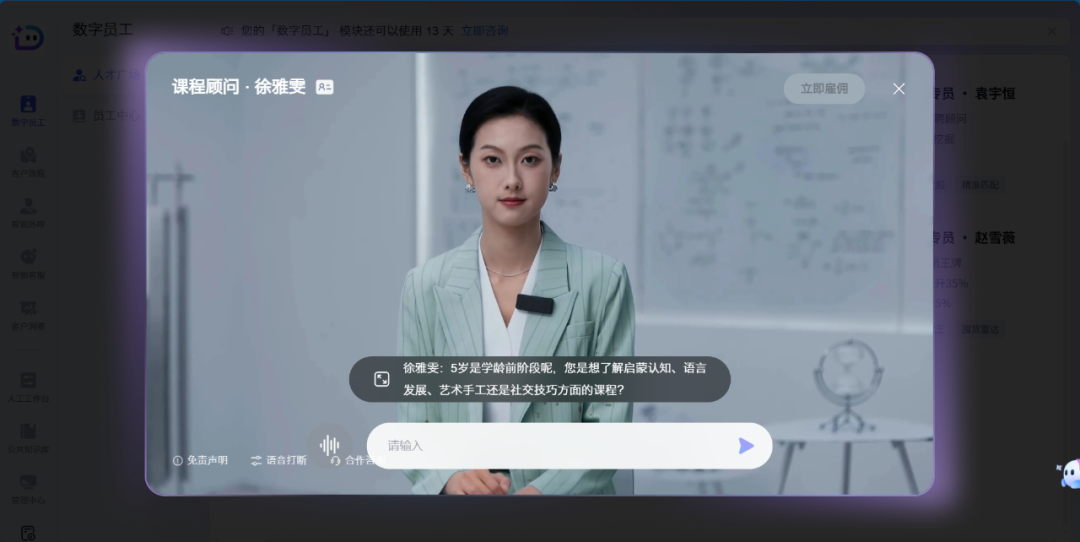
Take Xu Yawen, a digital employee in Baidu's education industry, as an example. It doesn't just answer FAQs like 'When is the course?' but provides course recommendations based on user needs. During interactions, it asks follow-up questions and makes recommendations grounded in business understanding.
This type of conversation transcends the traditional 'script recitation' commonly seen in AI assistants, showcasing contextual understanding, business intent recognition, and process perception.
The difference lies in: traditional AI assistants mostly remain at the process execution end, manifesting as fixed question templates and standardized answers, often unable to handle unscripted queries or maintain logical continuity in multi-round conversations. In contrast, digital employees maintain conversational coherence in complex, unstructured real-world scenarios, consistently advancing conversational goals.
Furthermore, this 'understanding' extends beyond scripting or semantics to grasping emotions and key points. A capable digital employee often intervenes at opportune moments, such as when a user hesitates, grasps the rhythm during price negotiations, and adjusts scripting when expressing concerns.
Baidu's digital employees exhibit behavioral choices akin to a real new employee who has been on the job for two months, mastering the complete SOP and responding flexibly. This underpins the standard of 'understanding the business'—not mimicking interactions but possessing result-driven business perception and judgment.
This is also Baidu's second employment standard this time: delivering results. Previously, enterprises' digital employees often showcased technology more than delivering practical outcomes. This time, Baidu explicitly states that digital employees are not technological demonstrations but job roles that must deliver results.
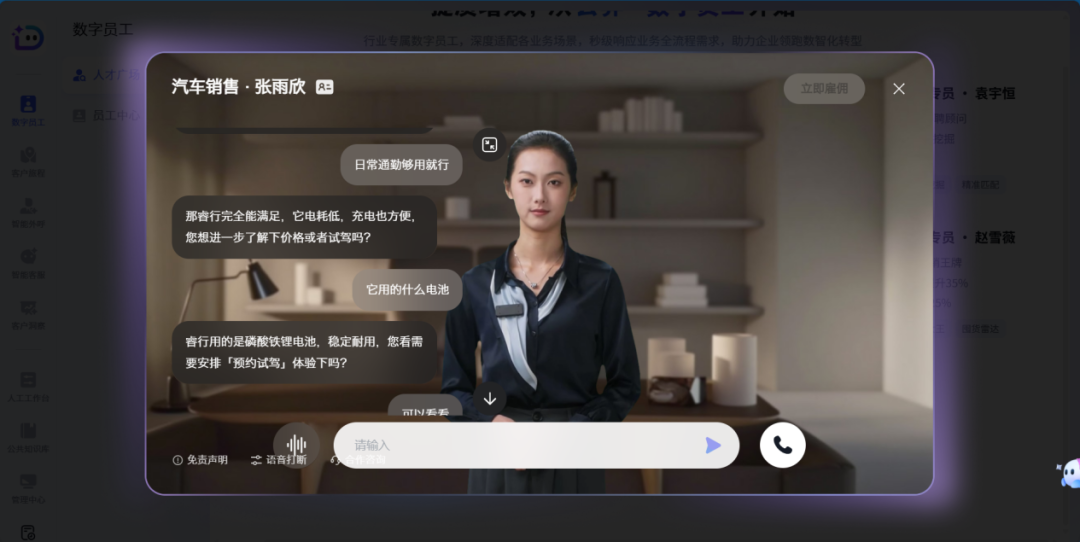
Consider the experience in the automotive sales scenario. When you're unsure of your needs, digital employee Zhang Yuxin automatically recommends products based on user intent. After each conversation round, it optimizes scripting based on the current conversation flow and asks follow-up questions like 'Would you like to take a test drive?'
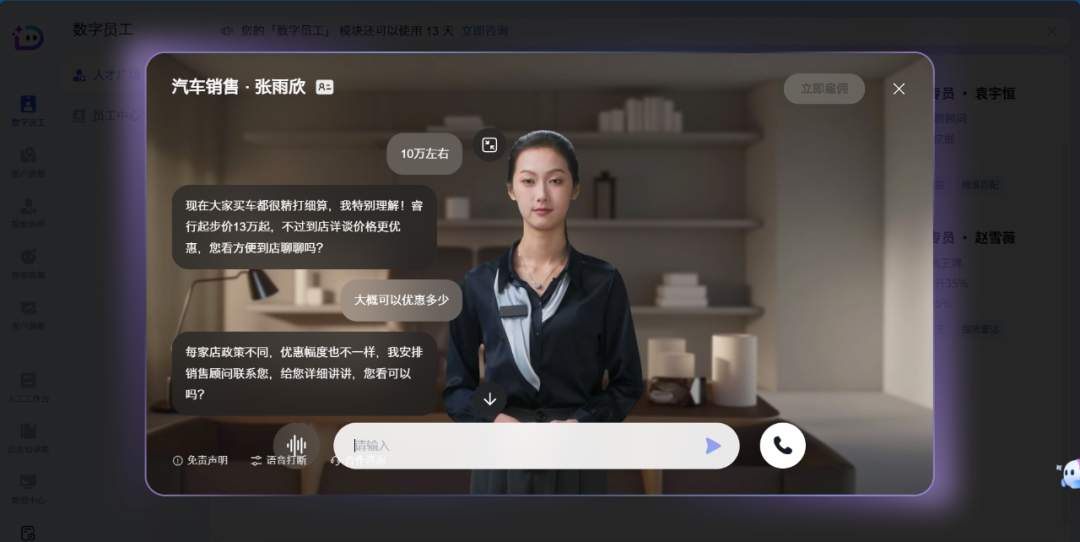
When you mention a budget constraint, Zhang Yuxin provides a promotion plan. Interestingly, when you inquire about promotion details, she doesn't exhibit large models' common 'hallucinatory data' but clearly defines information boundaries and skillfully arranges for a real sales consultant to follow up, maintaining the chain of trust.
Throughout, she doesn't just complete a conversation but the entire process from customer identification, consultation to order placement. She participates in real business chains and bears quantifiable business metrics like lead volume, conversion efficiency, and customer satisfaction.
Enterprise processes evolve, and customer preferences change. Baidu believes a true 'digital employee' should possess human-like learning abilities. Through continuous conversational data accumulation and feedback optimization, each digital employee adjusts strategies and updates expressions during the 'probation period,' forming an individualized evolution path.
This is Baidu's third standard for digital employees: evolving. In the era of large models, 'digital employees' are not one-size-fits-all templates but 'virtual business entities' capable of continuous learning.
For enterprises, this isn't a static 'AI assistant' but a growing job member. The longer an enterprise uses it, the better the effect, mirroring the capability compounding of 'veteran employees.'
These three standards affirm that a digital employee is not just an 'able to chat' AI but a 'capable of holding a position' individual. Behind this, Baidu aims to use a set of engineering systems and an integrated industry knowledge framework to answer how AI can genuinely participate in organizational collaboration.
02 Best Practices for Enterprise-Level Agents with AI Full-Stack Capabilities
Standards have been set, but implementing them isn't a mere slogan.
For digital humans to truly become a business part, not just a technological demonstration, a comprehensive technical architecture spanning from foundation to scheduling, execution to collaboration, is essential.
On the one hand, regarding human-like basic capabilities, Baidu Intelligent Cloud has created human-like 'intelligent brains' and 'real-person-level images' for digital employees.
First, the 'intelligent brain.' In speech interaction, Baidu Intelligent Cloud pioneered a cross-modal speech-language large model based on Cross-attention technology, integrating speech recognition, large language models, and speech synthesis to ensure digital employees can understand and comprehend swiftly, outputting the most suitable emotions and feedback based on text, achieving an industry-leading end-to-end closed loop of speech recognition, comprehension, and synthesis, with a speech recognition accuracy rate of 98% and interaction delay controlled within 1 second.
Simultaneously, to enhance business communication trust, a 'real-person-level image' has been crafted. In portrait effects, Baidu offers film-grade virtual human generation capabilities. Based on China's first 4D scanning technology, it precisely replicates facial muscle movements like smiling through over a thousand control dimensions, presenting a film-grade image. In expression, only a 30-second voice sample is needed to replicate high-fidelity speech, comparable to a real person's original voice, making the digital human 'look and sound real.'
On the other hand, regarding professional business capabilities, digital employees are endowed with an 'industry-oriented core' and 'evolutionary' genes.
For digital employees to truly 'understand the business,' accumulation beyond technology is crucial. Baidu Intelligent Cloud transforms industry Know-How into sustainable intelligent assets, evolving from 'function delivery' to 'value delivery.'
Drawing on the '10,000-hour rule,' Baidu Intelligent Cloud trains digital employees' initial capabilities through over 100,000 hours of industry practical data, accumulating professional SOPs in over 100 vertical fields like financial wealth management norms, educational teaching processes, and automotive production and sales knowledge.
For instance, the trial-listen-conversion-renewal path in education, credit and risk control processes in finance, and automotive enterprises' strategies in customer profiling and promotion matching. These industry Know-hows are abstracted into knowledge graphs and reusable modules, providing a realistic foundation for digital employees to be 'proficient upon taking up the position.'
More importantly, these digital employees aren't 'final states upon going live' but can continuously learn through Baidu Intelligent Cloud's self-developed simulation conversation self-iteration system and dynamic feedback mechanism. Each interaction accumulates data, optimizes strategies, and forms a closed-loop capability from task adaptation to knowledge updating.
This means the longer an enterprise deploys them, the more proficient digital employees become, and the closer their effects align with the long-term growth path of 'veteran employees.'
As large model capabilities accelerate iteration and data training increases, it ensures digital employees' performance continuously evolves with business changes, forming an accumulation curve where 'the longer the deployment, the higher the professionalism.'
Baidu isn't the first to create 'digital humans,' but it may be the first to truly transform them into controllable, usable, and rewarding productivity tools for enterprises through a systematic engineering capability. Baidu's digital employees represent the current best practices for enterprise-level agents.
03 On the Eve of Enterprise-Level Market Explosion
Unlike vibrant AI large model applications in the C-end market, the enterprise-level market's key lies not in technological showmanship but in cost-benefit balance. For enterprises to invest, it must inevitably return to the business essence: whether the investment's effect is worthwhile.
Currently, the digital human market exhibits a coexistence of 'structural explosion' and 'gradual evolution.'
The explosion stems from two variables: first, a near-60-fold drop in inference costs over the past year; second, a leap in multimodal capabilities, making digital humans no longer mere interactive interfaces but execution entities capable of forming business closed loops.
This signifies digital humans have truly stepped from 'technological demonstrations' to 'commercial delivery.' However, during landing, as large model application scenarios extend to low-tolerance, highly specialized fields, the real demand pain points often limit digital humans' large-scale landing speed.
Constrained by the need for deep industry Know-How precipitation, such scenarios require refining vertical decision-making chains and creating out-of-the-box solutions to deliver quantifiable business effects. Therefore, in growth trends, a gradual penetration curve often forms.
Taking frontline functions like sales, customer service, recruitment, and academic affairs as examples, much of employees' time is consumed in fixed process execution, information communication, and follow-up coordination. While these links are trivial, they're crucial and directly impact conversion rates, customer satisfaction, and operational efficiency.
Relying on human resources to address these issues is costly, inefficient, challenging for performance appraisal, and poor in organizational replicability. Traditional RPA or intelligent assistants, while capable of executing rule-based tasks, struggle with complex, unstructured conversations and multi-round collaborative tasks.
Key challenges like process fragmentation, inflexible responses, and contextual loss have emerged as significant hurdles impeding the successful implementation of intelligence. What truly hampers the speed of digital humans' integration isn't computing power or generation capabilities but whether these products can address the genuine pain points of enterprises.
Enterprises are in dire need of intelligent agents that comprehend business objectives, grasp context, facilitate cross-platform collaboration, and continually refine strategies. Baidu's 'digital employees' concept epitomizes such agents tailored to real-world demands: they are not merely 'virtual humans' but 'competent professionals' capable of performing real work.
Currently, Baidu Intelligent Cloud's digital humans are extensively serving over 20 industries, including e-commerce, finance, education, media, culture and tourism, healthcare, and the pan-internet sector. More importantly, their return on investment is already compelling.
In e-commerce, digital anchors cost less than 15% of real anchors but contribute to 85% of the gross merchandise value (GMV). In education, digital teachers enhance course production efficiency by 20 times and reduce costs by approximately one-third.
From a cost perspective, these statistics indicate that enterprises are not merely 'procuring technology' but integrating a new kind of employee with tangible job value. Digital employees represent an assessable, deployable, and continuously evolving workforce.
A broader trend is also unfolding: enterprises' acceptance of AI agents is surging. The '2025 China AI Agent Marketing Market Development Potential Research Report' highlights that China's AI agent marketing and sales market reached 44.2 billion yuan in 2024 and is projected to soar towards the trillion-yuan mark in the next five years.
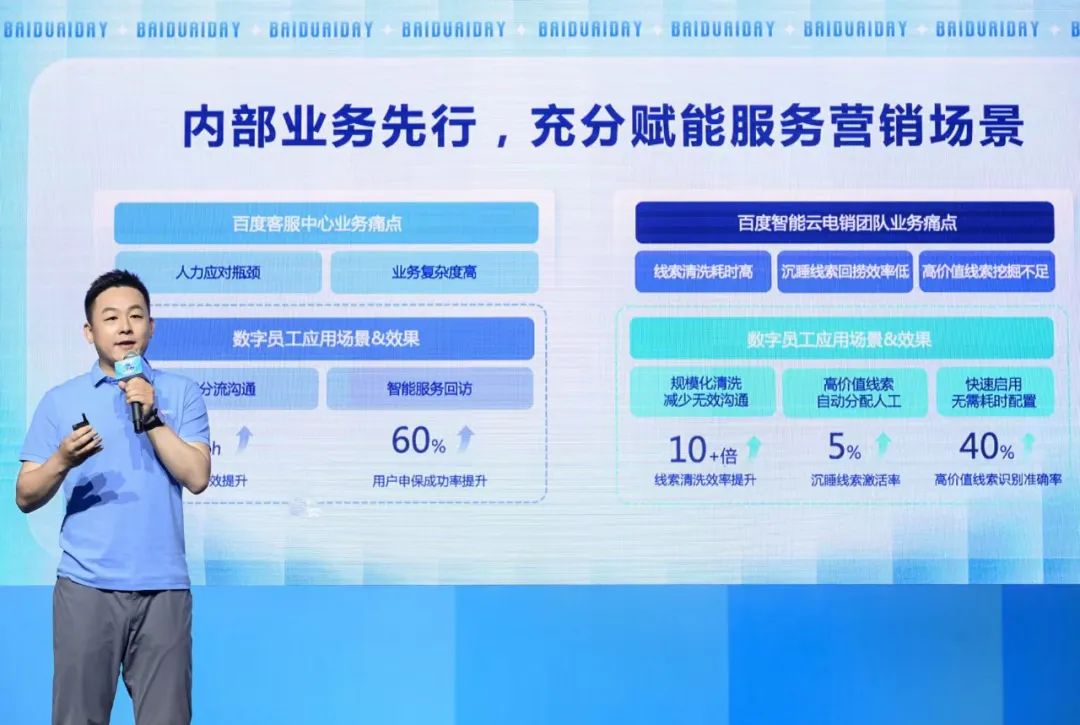
Baidu is also deploying digital employees within its operational system. Currently, they are operational in Baidu's customer service center for online triage and service follow-ups. Data reveals a 60% increase in the success rate of user insurance applications and a 18-hour improvement in service timeliness.
Shi Zheng, General Manager of Baidu Intelligent Cloud's Intelligent Marketing Products, emphasized that human-machine collaboration is the prevailing trend, and in the future, multiple digital employees may collaborate to tackle complex tasks.
The future of digital employees isn't about replacing humans but rather establishing a new organizational structure centered on 'human-machine collaboration.' Multiple intelligent agents will work together to complete complex tasks, empowering enterprises with a 'standardized, highly reusable, and evolvable' AI workforce pool. This marks the beginning of AI engineering capabilities penetrating enterprise boundaries and could be the most pivotal turning point on the eve of the digital humans' enterprise-level market explosion.








